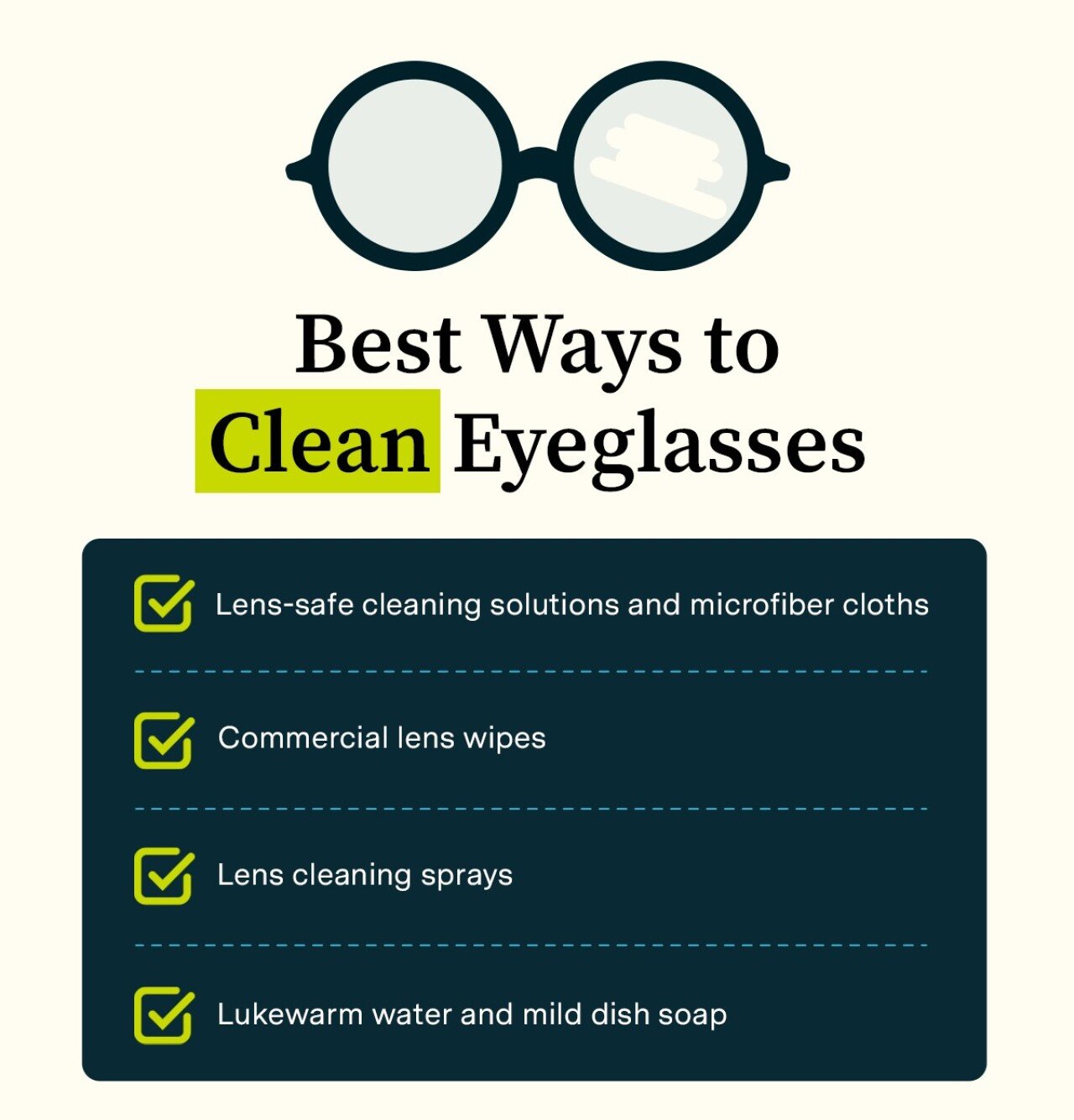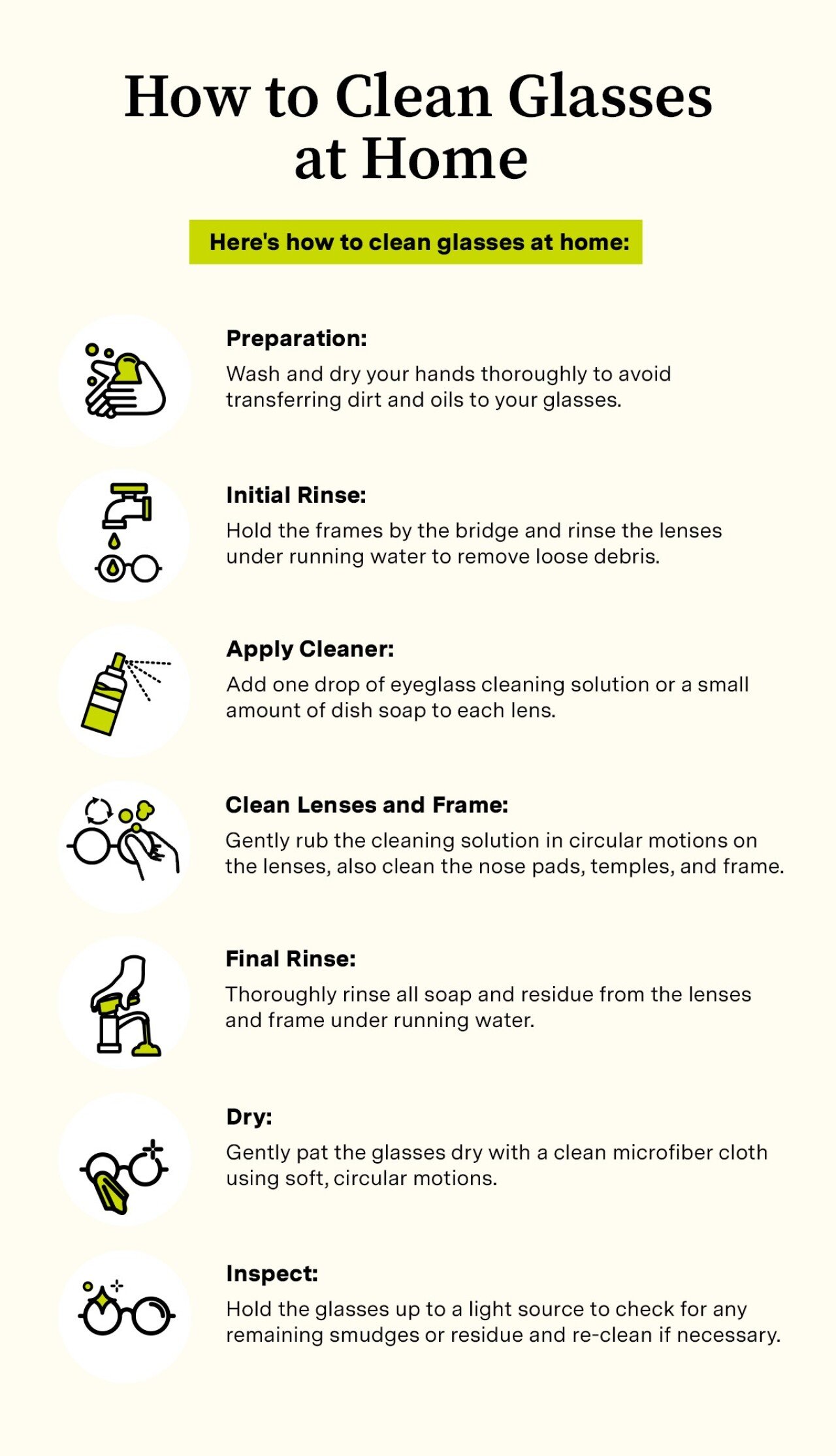Maintaining your eyeglasses should involve daily cleaning with microfiber cloths, proper storage in protective cases, and regular professional checkups to ensure optimal vision and lens longevity.
Your eyeglasses help you see the world clearly, yet many people don't realize how important it is to keep them clean and well-maintained. Whether you've worn glasses for years or recently joined the millions who rely on corrective lenses, understanding how to care for your eyewear is essential.
This expert guide from Eyemart Express outlines proven methods for cleaning and maintaining eyeglasses, ensuring they serve you well while keeping your eyes comfortable and healthy.
Regular cleaning and maintenance of eyeglasses improves your vision, protects eye health and helps lenses last longer. When glasses get dirty with oil and debris, they create visual blocks that force your eyes to work harder, leading to eyestrain and headaches. Clean lenses let light pass through properly, allowing your prescription to work as intended.
Neglecting proper eyeglass care can cause several problems for your vision and eye health. Built-up bacteria on frames and nose pads can irritate your skin and cause eye infections, particularly when the glasses touch your face throughout the day. Using the wrong cleaning methods often creates tiny scratches on lenses that scatter light and make it harder to see clearly over time. Additionally, the buildup of oils and debris can damage lens coatings, ruining their protective properties and requiring costly repairs.
The benefits of taking regular care of your glasses go beyond clear vision:

The best way to clean eyeglasses is to use the right cleaning solutions, along with proper methods and tools made for lenses. Eye care professionals recommend using microfiber cloths with lens-safe cleaning solutions as the main cleaning method, since this combination removes oils and dirt without harming delicate lens coatings.
The best lens cleaning methods include:
Lens cleaning kits combine everything you need for eyeglass care in one convenient package. These kits usually include microfiber cloths, a bottle of lens-safe cleaning solution, and sometimes extras like lens brushes or tiny screwdrivers for fixing frames. A complete kit ensures you always have the right tools available, wherever you are. Many optical shops offer starter kits when you purchase glasses.
Cleaning your glasses at home keeps them clear between professional cleanings, helping you see better and making your lenses last longer. The key to good home cleaning is using the proper techniques that protect your lenses while thoroughly removing oils, dust and dirt. Regular cleaning at home stops dirt buildup that can damage coatings and keeps your glasses working their best.
Here's how to clean glasses at home:
You should avoid any items that will scratch the lenses or leave streaks, as these can limit the longevity of your glasses. Knowing what to avoid is as important as knowing how to clean them. Steer clear of the following:
The best way to maintain your glasses is to establish daily cleaning routines, store them properly and get regular professional adjustments. Following these regular maintenance habits prevents damage from neglect, keeping your glasses comfortable and working well for years instead of months.
Here's how to maintain your eyeglasses so they'll serve you for longer:

You should care for special lens types using gentler cleaning methods and following manufacturer-specific care instructions to preserve their unique protective features. Different lens materials and coatings have specific needs that affect how you should clean them to maintain their special properties without causing damage.
Anti-Glare Glasses
Antireflective or anti-glare coatings reduce glare and reflections by letting more light pass through the lens. These coatings are especially sensitive to improper cleaning methods, since their multiple layers can separate or become cloudy when exposed to harsh chemicals.
To clean antireflective glasses, use cleaning solutions labeled as AR-safe and avoid products with ammonia or strong solvents. These lenses show fingerprints and smudges more easily and need more frequent cleaning with clean microfiber cloths.
UV Protection Glasses
UV coatings block harmful ultraviolet rays from reaching your eyes. Polarized and photochromic lenses feature UV coatings. Polarized lenses in sunglasses need special care to keep their glare-reducing filter layer. Use only manufacturer-recommended cleaners and avoid ultrasonic cleaners that can damage the polarization film.
Photochromic or transition lenses that darken in sunlight keep their color-changing ability best when cleaned with gentle, residue-free solutions. Don't leave these lenses in hot cars, as extreme heat can permanently affect how fast they change.
High-Index Glasses
If you have a high prescription that features multiple coatings, like UV, light and scratch resistance, you probably have high-index glasses. These glasses are thinner and made of a special type of plastic that bends easily and is therefore more fragile.
Use a pH-neutral cleaning solution to clean high-index glasses. Ask your optician for specific recommendations for your lens type. Following proper care instructions maintains warranty coverage and ensures your lenses work well.
You should seek professional eyeglass care when home cleaning no longer restores the clarity of your lenses or your glasses don't feel aligned. Professional optical care services make sure you can use your glasses for longer.
Several signs indicate your glasses need professional help beyond regular home care, including:
You should also schedule annual preventive maintenance to catch problems before they get serious. Regular checkups find loose screws, worn nose pads and coating wear early, when simple fixes prevent expensive repairs.
Professional cleaning removes buildup that home methods miss, especially in frame joints and nose pad parts. In-store visits also ensure proper frame adjustment as frames naturally loosen over time. Properly fitted glasses spread weight evenly, preventing pressure points and ensuring lenses line up correctly with your eyes.
Optical professionals provide complete services beyond basic cleaning and adjustment:
Many optical shops offer free cleaning and adjustment services for glasses bought from them, making regular maintenance easy and affordable. During these visits, you can also ask about new lens technologies or coating options that might help your specific needs.
Here is more information on cleaning and maintaining eyeglasses:
How often should I clean my eyeglasses?
You should clean your eyeglasses daily with a quick microfiber cloth wipe and thoroughly clean them with solution at least twice weekly or whenever they look dirty. Daily cleaning prevents oil and dirt buildup that becomes harder to remove over time. If you work in dusty places, exercise regularly or handle glasses often, you may need to clean them more frequently.
Can I use alcohol wipes on lenses?
You should not use alcohol wipes on most eyeglass lenses because they can damage coatings. Alcohol-based products can strip antireflective coatings, cloud lenses and damage frame materials. Some lens makers produce alcohol-based cleaners safe for their specific products, but regular alcohol wipes often have concentrations too strong for glasses.
What should I do if my glasses are scratched?
Consult an optical professional who can assess whether buffing might help minor scratches or if you need lens replacement for deeper damage. Minor scratches sometimes improve with professional buffing services, but deep scratches usually need new lenses for the best vision. Do not use home remedies like toothpaste or baking soda that claim to remove scratches, as they can worsen the damage.
How can I clean glasses with severe buildup?
Soak them in warm water with dish soap for several minutes, then gently scrub with a soft toothbrush, focusing on frames and nose pads where grime collects. For stubborn gunk, optical professionals recommend special enzyme cleaners that break down protein deposits. If this doesn't work, get ultrasonic cleaning done at an optical shop.
Are ultrasonic cleaners safe for all glasses?
Ultrasonic cleaners are safe for most glasses but can damage certain special coatings, loose decorative elements or specific lens treatments, so always check with your eye care provider first. It's best to visit an optical shop for ultrasonic cleaning to avoid damaging your lenses and coatings.
Keep your glasses clean
Proper eyewear care is a small daily effort, but it offers big rewards over time. By following the proven techniques in this guide, you'll protect your eye health and the money you spent on quality eyewear.
This story is intended for informational purposes only and does not constitute medical advice.
This story was produced by Eyemart Express and reviewed and distributed by Stacker.
Reader Comments(0)